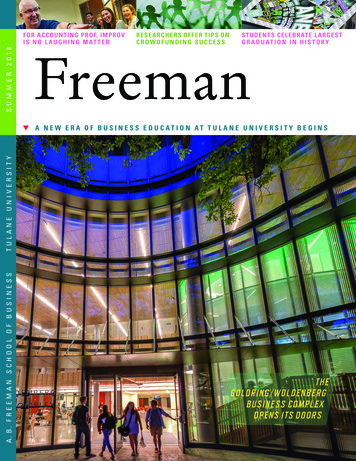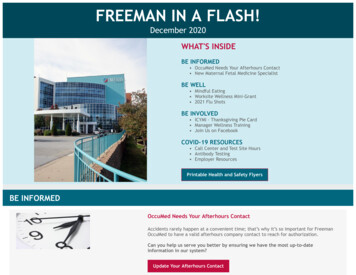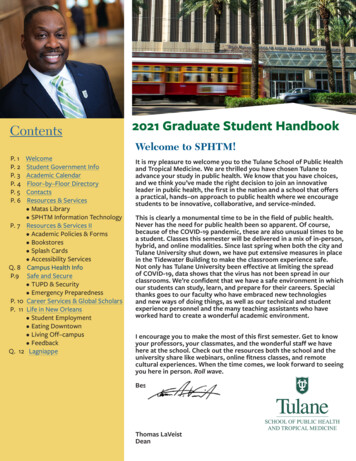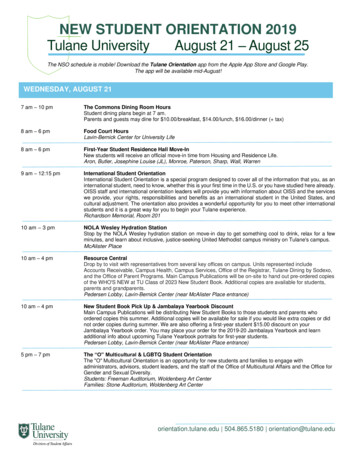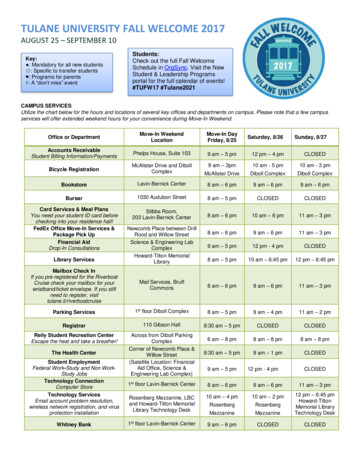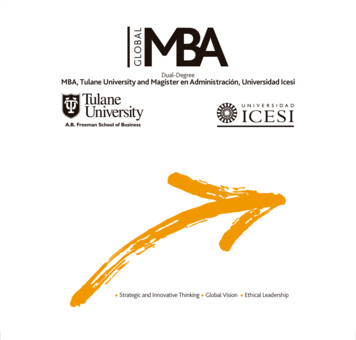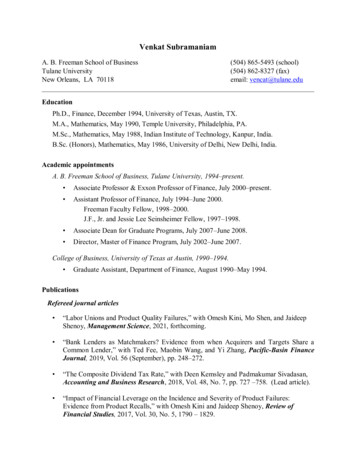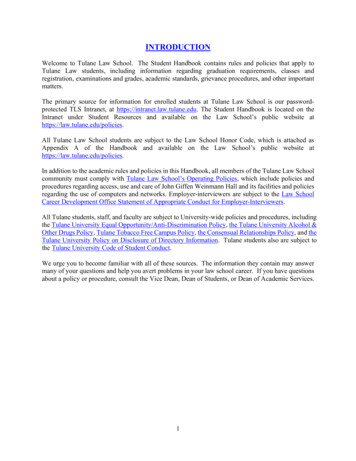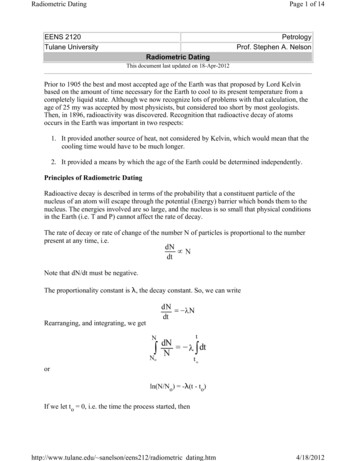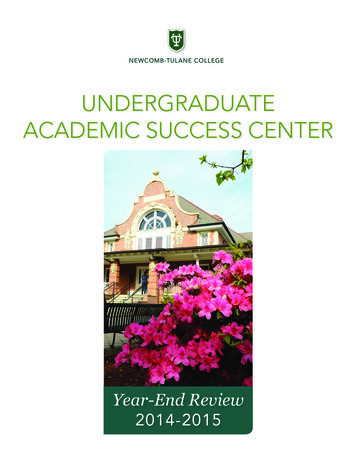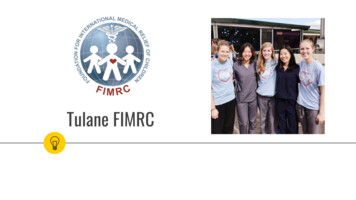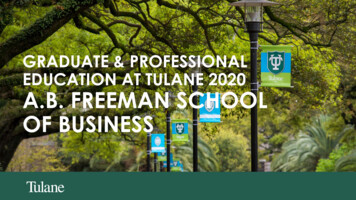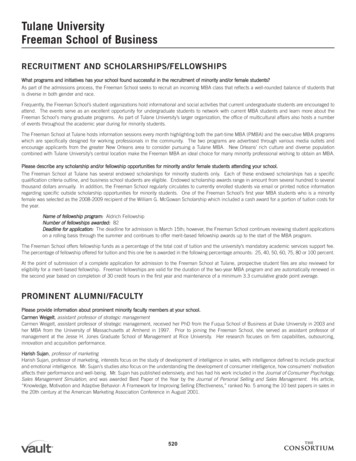
Transcription
Tulane UniversityFreeman School of BusinessRECRUITMENT AND SCHOLARSHIPS/FELLOWSHIPSWhat programs and initiatives has your school found successful in the recruitment of minority and/or female students?As part of the admissions process, the Freeman School seeks to recruit an incoming MBA class that reflects a well-rounded balance of students thatis diverse in both gender and race.Frequently, the Freeman School’s student organizations hold informational and social activities that current undergraduate students are encouraged toattend. The events serve as an excellent opportunity for undergraduate students to network with current MBA students and learn more about theFreeman School’s many graduate programs. As part of Tulane University’s larger organization, the office of multicultural affairs also hosts a numberof events throughout the academic year during for minority students.The Freeman School at Tulane hosts information sessions every month highlighting both the part-time MBA (PMBA) and the executive MBA programswhich are specifically designed for working professionals in the community. The two programs are advertised through various media outlets andencourage applicants from the greater New Orleans area to consider pursuing a Tulane MBA. New Orleans’ rich culture and diverse populationcombined with Tulane University’s central location make the Freeman MBA an ideal choice for many minority professional wishing to obtain an MBA.Please describe any scholarship and/or fellowship opportunities for minority and/or female students attending your school.The Freeman School at Tulane has several endowed scholarships for minority students only. Each of these endowed scholarships has a specificqualification criteria outline, and business school students are eligible. Endowed scholarship awards range in amount from several hundred to severalthousand dollars annually. In addition, the Freeman School regularly circulates to currently enrolled students via email or printed notice informationregarding specific outside scholarship opportunities for minority students. One of the Freeman School’s first year MBA students who is a minorityfemale was selected as the 2008-2009 recipient of the William G. McGowan Scholarship which included a cash award for a portion of tuition costs forthe year.Name of fellowship program: Aldrich FellowshipNumber of fellowships awarded: 82Deadline for application: The deadline for admission is March 15th; however, the Freeman School continues reviewing student applicationson a rolling basis through the summer and continues to offer merit-based fellowship awards up to the start of the MBA program.The Freeman School offers fellowship funds as a percentage of the total cost of tuition and the university’s mandatory academic services support fee.The percentage of fellowship offered for tuition and this one fee is awarded in the following percentage amounts: 25, 40, 50, 60, 75, 80 or 100 percent.At the point of submission of a complete application for admission to the Freeman School at Tulane, prospective student files are also reviewed foreligibility for a merit-based fellowship. Freeman fellowships are valid for the duration of the two-year MBA program and are automatically renewed inthe second year based on completion of 30 credit hours in the first year and maintenance of a minimum 3.3 cumulative grade point average.PROMINENT ALUMNI/FACULTYPlease provide information about prominent minority faculty members at your school.Carmen Weigelt, assistant professor of strategic managementCarmen Weigelt, assistant professor of strategic management, received her PhD from the Fuqua School of Business at Duke University in 2003 andher MBA from the University of Massachusetts at Amherst in 1997. Prior to joining the Freeman School, she served as assistant professor ofmanagement at the Jesse H. Jones Graduate School of Management at Rice University. Her research focuses on firm capabilities, outsourcing,innovation and acquisition performance.Harish Sujan, professor of marketingHarish Sujan, professor of marketing, interests focus on the study of development of intelligence in sales, with intelligence defined to include practicaland emotional intelligence. Mr. Sujan’s studies also focus on the understanding the development of consumer intelligence, how consumers’ motivationaffects their performance and well-being. Mr. Sujan has published extensively, and has had his work included in the Journal of Consumer Psychology,Sales Management Simulation, and was awarded Best Paper of the Year by the Journal of Personal Selling and Sales Management. His article,“Knowledge, Motivation and Adaptive Behavior: A Framework for Improving Selling Effectiveness,” ranked No. 5 among the 10 best papers in sales inthe 20th century at the American Marketing Association Conference in August 2001.520
Vault/CGSM Guide to Business School Diversity, 2010 EditionTulane University (Freeman)Please provide information about prominent minority alumni from your school.David Morris, MBA 1994, founder and managing director, Oracle Capital PartnersFounder and managing director of Oracle Capital Partners, has been named one of the “Top 50 Under 50” by Diversity MBA Magazine. The Top 50Under 50 highlights successful young African-Americans in the corporate world. The executives featured on the list were selected based on position,budgetary responsibility, community service and the MBA degrees they hold. “It makes us proud to know that corporations find value in diversity andare willing to recognize their top talent for the great contributions they make to their bottom line,” said Pamela McElvane, publisher and CEO. “Thisconfirms that diversity in the workplace is fiscally beneficial.” Oracle Capital Partners is a 20 million private equity company that focuses on investingin emerging domestic market firms. The company, based in Detroit, is the first venture capital firm in Michigan to target businesses that are managedand/or controlled by ethnic minorities.Prior to founding Oracle Capital Partners, Morris was an investment banker with UBA Warburg, focusing on mergers and acquisitions in the firm’s NewYork and Tokyo offices. He also served as an assistant vice president in the corporate banking group of AmSouth Bank and as a banking officer atHibernia National Bank. Morris began his banking career at First Commerce Corp.Dan Packer, MBA 1998, former chief executice officer, Entergy New OrleansFrom a humble beginning in segregated Alabama, Daniel Packer rose to become the first African-American to manage a nuclear power plant. Mr.Packer went on to serve as CEO of Entergy New Orleans and landed on Black Enterprise’s 2005 list of most powerful African-American executives.During his ascent up the corporate ladder, Mr. Packer developed a reputation as both a compassionate leader and levelheaded negotiator. He alsobecame a role model. “He was making a name for himself outside of athletics or entertainment,” an African-American executive told New Orleans CityBusiness. “Given our culture, that becomes increasingly significant as time goes on.” Mr. Packer has held several high-profile memberships includingthe American Association of Blacks in Energy, president emeritus; the NFL Stadium Advisory Commission, chairman, 2001; the New Orleans RegionalChamber of Commerce, chairman, 2001; the New Orleans Aviation Board, chairman, 2002; and the Bring New Orleans Back Commission, member,2005 to present. Mr. Packer has also received the YMCA, Black Achievement Award, 1988; Tulane University, Weiss Award, 2001; Boy Scouts ofAmerica, Southeast Louisiana Council, Whitney Young Service Award, 2004.C. Ray Nagin, MBA 1994, mayor, New OrleansMayor Ray Nagin received his MBA from Tulane University in 1994. Mr. Nagin won the New Orleans mayoral election in May 2002, in spite of neverholding a previous elected office and was the first mayor in 60 years to do so. Before his election as mayor of New Orleans in 2002, Mr. Nagin was avice president and general manager at Cox Communications, a cable company and subsidiary of Cox Enterprises. Under Mayor Nagin’s leadership,Hollywood South was created and New Orleans became the second city behind Hollywood for film production, bringing in nearly a half-billion dollarsin the last few years. During Mayor Nagin’s first term, New Orleans enjoyed billions in construction activity, a red-hot real estate market and boom inlarge-scale real estate commitments such as the highly anticipated Trump Tower, a 68-story five-star condo/hotel.Mayor Nagin also developed a multimillion-dollar housing plan to help city employees, single mothers and low- and moderate-income citizens becomehomeowners. The city pioneered with HUD an innovative program where first-time home buyers could utilize Section 8 certificates that qualified asmortgage payments. These tactics were so successful that 37,000 people were removed from the poverty rolls during the first three years of MayorNagin’s first term in office.Please provide information about prominent female faculty members at your school.Laura B. Cardinal, associate professorLaura B. Cardinal, associate professor, received her BA magna cum laude and her PhD in business administration from the University of Texas atAustin. Ms. Cardinal has received numerous awards and honors including the Michael H. Mescon Best Empirical Paper Award in 2006. Ms. Cardinalhas published work in a number of journals including Academy of Management Journal, Organization Science, Journal of Knowledge Management,Strategic Management Journal and the Journal of Accounting and Economics and is on the editorial board of both Organization Science and StrategicManagement Journal. In addition to her published articles, Ms. Cardinal co-authored New Directions in Theory and Research. Ms. Cardinal teachesa number of courses including Strategic Management, Management of Technology and Innovation and Environment, Society, Capitalism. Ms. Cardinalis currently the director of the Freeman School’s Burkenroad Institute and serves on a number of the Freeman School’s committees as well as theTulane University’s senate committee for student affairs. Ms. Cardinal is the Freeman School’s representative to the faculty senate. In addition, Ms.Cardinal has made numerous presentations at both domestic and international conferences.Mita Sujan, Malcolm Woldenberg Chair of MarketingMita Sujan is the Malcom Woldenberg Chair of Marketing in the Freeman School at Tulane and teaches several courses in consumer behavior andmarketing. Ms. Sujan’s paper “Knowledge, Motivation and Adaptive Behavior: A Framework for Improving Selling Effectiveness” was ranked as one ofthe five best sales articles of the 20th century by the American Marketing Association. According to a recent study co-authored by Ms. Sujan andKirsten A. Passyn, “Guilt is more effective than hope or fear in persuading people to undertake self-protective measures such as eating better or wearingsunscreen.” To arrive at their conclusions, Sujan and Passyn, a management and marketing professor at Salisbury University, conducted fieldexperiments with approximately 500 college students, examining behaviors such as getting vaccinated for a campus outbreak of meningitis, usingsunscreen and eating more high-fiber foods. The study was published in the March 2006 issue of The Journal of Consumer Research.521
Vault/CGSM Guide to Business School Diversity, 2010 EditionTulane University (Freeman)Adrienne Colella, professor and chair of doctoral studies and researchAdrienne Colella, professor and chair of doctoral studies and research, has published extensively including Discrimination at work: The psychologicaland organizational basis, Lawrence Erlbaum Associates, Inc., 2005 and Organizational behavior: a strategic approach, Wiley, 2006. In addition to hertwo monographs, Ms. Colella has published numerous book chapters and articles appearing in Academy of Management Review, Journal of AppliedSocial Psychology and Human Resources Management Review among others. Ms. Colella also holds several research grants in the area of disabilitiesin the workplace.Please provide information about prominent alumnae from your school.Cheryl Kauhane Lupenui, MBA 1991, chief executive officer, YWCACheryl Lupenui became the youngest chief executive officer ever of the YWCA of Oahu and the first Native Hawaiian to head that organization. Usingher business acumen and community passion, she worked to invigorate the nonprofit’s mission of empowering women and eliminating racism. Ms.Lupenui’s work outside the YWCA, particularly on behalf of Native Hawaiians, is exemplary.Yvette Jones, MBA 1995, chief operating officer and senior vice president for external affairs, Tulane UniversityAs COO and senior vice president for external affairs, Yvette Jones is responsible for providing leadership and essential resources for policy directionfor Tulane University. She oversees several departments including institutional development, strategic and campus planning, universitycommunications, government relations, institutional research, board telations, technology transfer and business development, human resources andinformation technology. Jones is directly responsible for guiding the university to raise 700 million for endowment, capital and other programmaticpurposes.Robin Peppe Sterneck, MBA 1982, head of commercial insurance, Swiss Reinsurance CompanyRobin Sterneck has held several leadership positions at GE Insurance Solutions before the unit was acquired by Swiss Reinsurance Company. As headof Swiss Reinsurance’s commercial insurance segment, Ms. Sterneck leads the strategy and operations of the 1 billion unit, which includes smallbusiness workers’ compensation, programs and general binding authorities, excess and surplus lines insurance, agents and lawyers professionalliability and the medical expense group product lines. Ms. Sterneck also serves as president of Coregis Insurance Company, Westport InsuranceCorporation and First Specialty Corporation.ORGANIZATIONS AND STUDENT LIFEPlease provide information on your school diversity student and alumni organizations.Black MBA AssociationThe purpose of Tulane’s Black MBA Association is to facilitate awareness and learning of issues affecting minorities in business and academia. Thisgroup sponsors lectures and community service programs and offers opportunities in career development. Membership is open to MBA, master’s ofaccounting, master’s of finance, PhD and undergraduate students.Tulane’s chapter of the National Association of Women MBAs (NAWMBA)The purpose of Tulane’s chapter of the National Association of Women MBAs, formerly Graduate Women in Business, is to enhance the experience ofwomen in the MBA program; to increase the number of women in the Freeman School; to promote women in business through community, educationaland service projects; to develop women as leaders; to build a strong network of MBAs; to participate in the national conference; and to support thegoals of NAWMBA.Please also provide information on any programs, including on-campus and universitywide programs in which MBA students participate that focus onissues related to women or minorities.Office of multicultural affairswww.oma.tulane.eduThe office of multicultural affairs provides programs and support services that not only address the unique needs and concerns of African-American,Asian/Pacific Islander-American, Hispanic/Latino/Mexican-American and American Indian students, but also serves as a mechanism to promoteequality and diversity throughout the university. Programs and activities sponsored by this office are directed at fostering personal growth, cultural/racialawareness and positive interactions within the larger campus environment. The office of multicultural affairs works hand in hand with academicdivisions and other support services to integrate multiethnic students and empower them to be active participants in the Tulane community. Mostmultiethnic and international student organizations are advised through this office. For more information, call (504) 865-5181 or go towww.oma.tulane.edu.Please provide information on any institutes and/or related programs that focus on diversity.Amistad Research CenterThe Amistad Research Center’s ties to the American Missionary Association (AMA) can be traced to the AMA’s roots in the coalition of abolitionists whocame to the defense of the Africans. Under the banner of the Amistad Defense Committee, abolitionists and attorneys, with help from former PresidentJohn Quincy Adams, took the case to the United States Supreme Court, which ruled that the Africans were free. The Amistad Committee evolved into522
Vault/CGSM Guide to Business School Diversity, 2010 EditionTulane University (Freeman)the interracial AMA, which since then has been in the forefront of the fight for freedom and justice. The AMA founded hundreds of abolitionist andanti-caste churches and schools among African-Americans, Native Americans, Puerto Ricans, Appalachian whites, Asian-Americans and MexicanAmericans. Distinguished colleges and universities that emerged from these efforts include: Atlanta, Berea, Dillard, Fisk, Hampton, Houston-Tillotson,LeMoyne-Owen, Piedmont, Talladega and Tougaloo.Newcomb College InstituteThe Newcomb College Institute is an academic and cocurricular home for all undergraduate women on the Tulane University campus. As the role ofwomen’s education is defined for this generation of students, the institute challenges the community to imagine an equitable world in which thecomplex contributions of women to society are of equal value to those of men. The Newcomb College Institute is dedicated to fostering an awarenessof the local and global conditions of women in society. Currently the Newcomb Foundation funds students pursuing global scholarly projects inSingapore, Japan, South Africa, Brazil and Ecuador and local rebuilding projects in New Orleans through the Newcomb Neighbors and Sophie theRiveter initiatives. The institute’s summits, leadership symposia, research fellowships, publications and courses lead women forward through their fouryears of undergraduate education by developing programming that honors and perpetuates the legacy of Newcomb College.Partnership for the Transformation of Urban Communities (PTUC)The focus of the Partnership for the Transformation of Urban Communities is to facilitate the building of healthy and sustainable communities locally,regionally and throughout the world. The institute sponsors educational programs, generates research initiatives and produces activities of nationaland international relevance, many of which emanate from the Hurricane Katrina experience. PTUC significantly expands the complexity of the issueswith which the university can engage and it creates a context from which Tulane can provide leadership both in rebuilding New Orleans and in buildinga better future for people everywhere. PTUC draws upon the expertise of the university’s entire faculty, especially those in social work, architectureand the social sciences in the School of Liberal Arts. The Institute also collaborates with the Tulane Center for Public Service, a new unit charged withcentralizing and expanding the scope of public service at the university. The Institute for the Study of Race and Poverty (ISRP), funded by the FordFoundation, facilitates and promotes social justice particularly for persons of color and the disadvantaged through research, education, policy andadvocacy.Southern InstituteBased at Tulane University, the Southern Institute is a nonprofit race relations center dedicated to improving ethnic relations in the Deep South throughtolerance education and communications training. Founded in 1993, the Southern Institute’s programs help young people understand the causes andconsequences of prejudice by examining the past. For the adult community, the Southern Insti
As part of Tulane University’s larger organization, the office of multicultural affairs also hosts a number of events throughout the academic year during for minority students. The Freeman School at Tulane hosts information sessions every month highlighting both the part-time MBA
